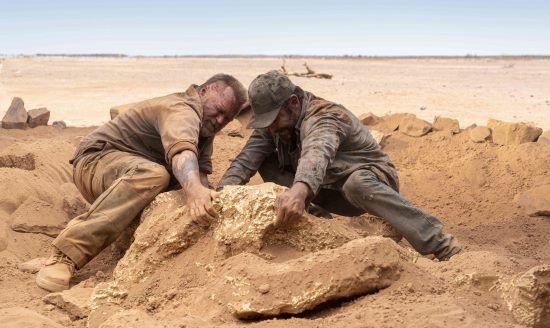Review: Gold – “Efron excels here, showcasing his talents in a way that we haven’t seen”

Anthony Hayes and Zac Efron in Gold
“Some time. Some place. Not far from now.”
These words form the ambiguous opening to Australian director Anthony Hayes‘ third feature film, Gold. Starring Zac Efron, with a supporting role from Hayes himself, this well-crafted film is, to describe it in one word, bleak. Co-writing alongside Polly Smyth, Hayes crafts an unforgiving look at the selfishness and greed of man against a landscape of environmental peril.
Zac Efron is as ragged as you’ve seen him, and the journey his character (named only as ‘Man One’) has taken leaves him bruised and battered, scarred with an unkempt beard and a limp to his gait. He arrives by train to the isolated, dilapidated Greenview Outpost where he is meant to meet a man who will take him to ‘the compound.’ Getting into the run-down truck with the man (Hayes, whose character is simply Man Two), he is clearly unimpressed, as the fees for his ride seem to mount and his driver lights his cigarettes with disregard inside the enclosed vehicle.
In limited conversation between the two men we learn little, save for the fact that Efron’s character comes from the ‘west’ where people had turned on one another. He’s now seeking opportunity for work and a better life at the compound. As the two drive on dirt tracks, they pass into the ‘Eastern Territories’, an ominously restricted access area. Some time, some place, not far from now is clearly not a time nor place to be desired. But one thing that hasn’t changed in this near-future world is the desire for riches. And when during their travels they discover a massive piece of gold, the men immediately see a future for themselves that seemed out of reach. The only problem is how to retrieve it. As the driver returns to civilization to get equipment for its excavation, Efron’s character is left to protect their claimed discovery in an unforgiving landscape where trust, even in yourself, is hard to come by.
For much of the film, the main adversary is the harsh, arid landscape in which Efron finds himself. Shot in the Australian Outback, Efron is on his own for the vast majority of the film, alone with the blazing heat of the sun, the dust, the isolation. It’s an environment where water is as much a commodity as the gold itself, and the dangers of the desert, including some pretty aggressive wild canids, are ever apparent. Cinematographer Ross Giardina captures it all with an over-exposed palette that washes out a lot of the colour, exemplifying this bright, harsh landscape with illuminated intensity.
Efron excels here, showcasing his talents in a way that we haven’t seen, more than capable of handling the weight of the film on his shoulders with so much of it being a solo act. He’s unable to rely on much dialogue, but is confident in his character’s internal grounding and emotion. His character makes some frustrating, ill-advised decisions, but then again if he didn’t, the dramatic effect would be lacking so its forgivable in the genre.
The other adversary the men are up against in the film is their own driving greed. And it’s here where Hayes’ direction and film as a whole are grim and relentless. The fate that befalls his characters is due to their own selfish decisions, their desperation, and just like the environment’s treatment of the men, the audience is left with little mercy for their actions. The song “People Ain’t No Good” by Nick Cave and the Bad Seeds plays over the end credits, and is an entirely appropriate finale to the film, demonstrating completely Gold‘s feeling toward the driving forces of man, where a good outcome for one outweighs the importance of the many. As I said, in one word: bleak.
Gold is released in released in theatres March 11th.

Warning for those sensitive to scenes with animals: a wild dog/coyote is beaten to death with a rock early on in the film. There are other gruesome scenes including them, though they are not harmed.









